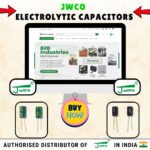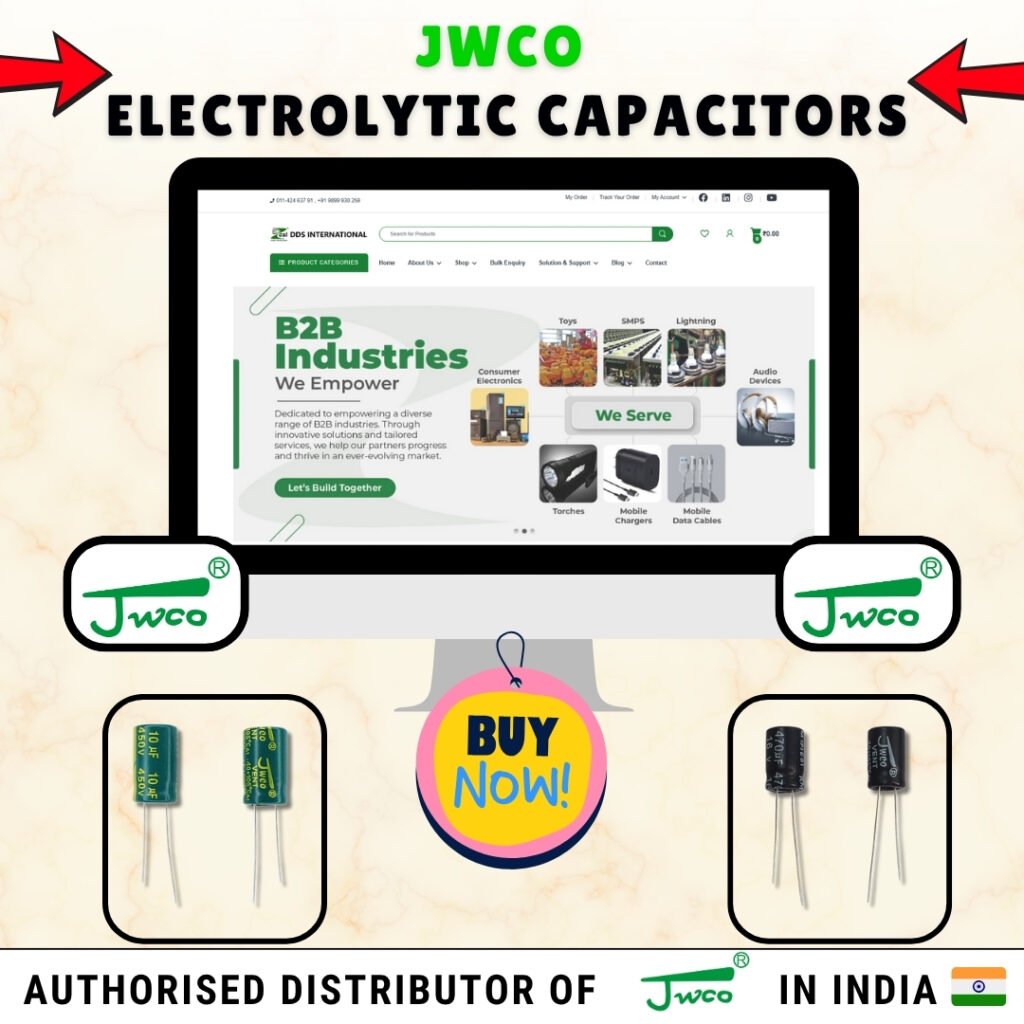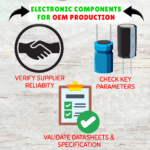Differences Between Electrolytic Capacitors and Normal Capacitors | Edzeal

Electrolytic Capacitors vs Normal Capacitors – What’s the Difference?
When it comes to electronic circuits, capacitors play a crucial role in storing and releasing electrical energy. However, not all capacitors are created equal. The two most common types used in industries are Electrolytic Capacitors and what we generally call Normal Capacitors (Ceramic or Film Capacitors). Both serve different purposes based on their design, performance, and applications.
At DDS International – Edzeal, we are an authorised distributor of JWCO Electrolytic Capacitors in India. This guide will help you understand the key differences between Electrolytic Capacitors and Normal Capacitors to make the right component choice for your electronic projects.

1. Construction
Electrolytic Capacitors
Electrolytic capacitors are made using two aluminum or tantalum plates separated by an electrolyte-soaked dielectric oxide layer. This construction allows them to achieve high capacitance in a compact size, ideal for power applications.
Normal Capacitors (Ceramic/Film)
Normal capacitors use materials like ceramic, plastic film, or paper as dielectrics. They have two metal plates sandwiching the dielectric, offering stable capacitance at lower values compared to electrolytic.
2. Capacitance Value Range
Electrolytic Capacitors
These capacitors offer high capacitance values, typically ranging from 1µF to several Farads. They are ideal for applications like power supply filtering, audio circuits, and energy storage.
Normal Capacitors
Normal capacitors like ceramic and film types offer capacitance values from picofarads (pF) to microfarads (µF). They are commonly used for signal coupling, decoupling, timing circuits, and noise suppression.
3. Voltage Ratings
Electrolytic Capacitors
Electrolytics can handle higher voltage ratings ranging from 6.3V to 500V or more. They are preferred in circuits requiring large capacitance under moderate-to-high voltage conditions.
Normal Capacitors
Ceramic and film capacitors generally have lower voltage ratings (from a few volts up to 1000V in specific cases). They are suitable for low-voltage circuits and high-frequency applications.
4. Polarity Considerations
Electrolytic Capacitors
Electrolytic capacitors are polarized, which means they have a positive (+) and a negative (-) terminal. Installing them in reverse polarity can cause failure or even dangerous ruptures.
Normal Capacitors
Normal capacitors are non-polarized. They can be connected in any direction without affecting circuit operation, making them versatile for general-purpose use.
5. Frequency Response
Electrolytic Capacitors
Due to their construction, electrolytic capacitors have limited frequency response and higher Equivalent Series Resistance (ESR). They are best suited for low-frequency applications like DC power filtering and energy storage.
Normal Capacitors
Ceramic capacitors excel in high-frequency circuits due to their low ESR and wide frequency response. They are commonly used in RF circuits, decoupling capacitors, and signal filtering.
6. Applications – Where Each Type is Used?
- Electrolytic Capacitors: Power supply filters, audio amplifiers, DC-link circuits, energy storage systems.
- Normal Capacitors: Timing circuits, coupling/decoupling, noise suppression, RF circuits.
Choosing the Right Capacitor for Your Project
If your project requires high capacitance and voltage handling in a compact size, electrolytic capacitors are the ideal choice. For high-frequency, low-noise, and stable performance, normal capacitors (ceramic or film) are preferred.
At DDS International – Edzeal, we stock a wide range of Electrolytic Capacitors from JWCO, along with our own Edzeal brand capacitors. Whether you’re designing power supplies, audio equipment, or consumer electronics, we have the right component for you.
Why Choose Edzeal for Electrolytic Capacitors?
- Authorised Distributor of JWCO Electrolytic Capacitors in India
- Wide inventory of Edzeal Electrolytic & Ceramic Capacitors
- Bulk orders and OEM Supplies at competitive prices
- Technical support for component selection
Explore our complete range of capacitors at www.edzeal.in or contact us for bulk inquiries and OEM support.



